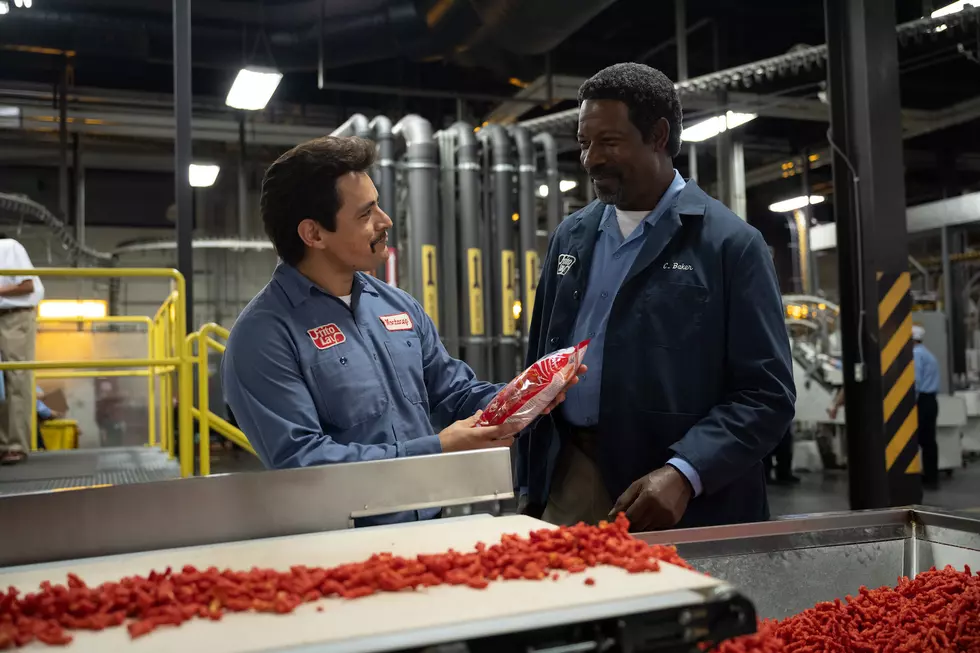
‘Flamin’ Hot’ Review: A Lukewarm Snack Chip Biopic
“We all write our own stories,” announces Richard Montañez in his voiceover narration for Flamin’ Hot, the film that dares to reveal the origin of the popular Flamin’ Hot line of snack chips. In Montañez’s case, that is literally true; Flamin’ Hot is based on his memoir about his improbable rise from janitor to Frito-Lay marketing executive, where he — at least in his telling — “invented Flamin’ Hot Cheetos in a secret test kitchen, breaking barriers and becoming the first Latino frontline worker promoted to executive at Frito-Lay.”
That’s the tale told in Montañez’s book and now in Eva Longoria’s Flamin’ Hot, a movie that positively radiates with print-the-legend energy. This irresistible rags-to-riches story has already been disputed by some observers, including a 2021 Los Angeles Times article that claimed Montañez greatly embellished his role in the launch of Flamin’ Hot Cheetos. That piece included an official comment from a Frito-Lay spokesman that read “We value Richard’s many contributions to our company, especially his insights into Hispanic consumers, but we do not credit the creation of Flamin’ Hot Cheetos or any Flamin’ Hot products to him.”
The notion that this snack success had many fathers suggests a much more interesting movie than Flamin’ Hot, one that leaned into the Rashomon-esque nature of the diverging accounts around who created what. Longoria’s film only briefly acknowledges that idea, like when Montañez’s voiceover notes that his wife says he likes to “exaggerate,” and in one scene where Frito-Lay scientists are shown dripping unnamed chemicals into beakers in an attempt to artificially engineer a spicy snack chip — a stark contrast to Montañez’s organic approach. As depicted onscreen, Montañez developed his own “spicy slurry” to pour over Frito-Lay products by buying every chili pepper in the grocery store and taste-testing each until he found the perfect blend of flavors.
READ MORE: Separating Fact and Fiction in the Tetris Movie
Some parts of Montañez’s incredible story are indisputable: He did work his way up from a maintenance man to a gig as a Frito-Lay marketing executive who specialized in multicultural promotions. (That skeptical Times article quoted one former executive who said “without Richard, this thing [Flamin’ Hot Cheetos] would not be out there.”) Either way, a movie like Flamin’ Hot isn’t a documentary, and its historical accuracy is arguably less important than its emotional authenticity. Do we care about Richard? Do we cheer for his successes?
Sometimes. The story Flamin’ Hot tells is intermittently inspiring and energetic, and it rests on a likable performance from Jesse Garcia as the irrepressible Richard, a classic underdog who comes from nothing and refuses to take no for an answer. The film’s larger problem isn’t its truthiness or lack thereof; it’s the fact that for all its boasting about shining a spotlight on a unique story, Flamin’ Hot often feels familiar and formulaic, like something that could have rolled off an assembly line like the ones in the factory where Richard Montañez made his groundbreaking discoveries.
Garcia narrates Richard’s tale from beginning to end, starting with his childhood in Southern California, where he dealt with an abusive father and racist classmates, and then turned to crime as a young man. When his endlessly encouraging wife Judy (Annie Gonzalez) gets pregnant, Richard realizes he needs to settle down. Despite his lack of an education, Richard is a born salesman, and he talks his way into an entry-level job as a custodian for Frito-Lay. Once there, he ignores the orders of his superiors (including a plant manager played by Matt Walsh) who tell him to keep quiet and do his job — and instead begins asking questions about how chips are made and how they could be improved.
He eventually bonds with a plant machinist named Clarence (Dennis Haysbert) over their shared struggles with discrimination; Clarence has been passed over for one promotion after another because of the color of his skin, despite the fact that he’s the one who taught many of the plant’s white leadership everything they know about snack production. Clarence takes Richard under his wing, helps him learn the ins and outs of the business, and backs him up when Richard stumbles on his big idea: Catering to the underserved Latino market — “our people,” Richard likes to call them — with a line of snacks packed with spices.
Accurate or not, the sequence where Richard develops his Flamin’ Hot concept is the movie’s highlight thanks in large part to the scene-stealing performance of Brice Gonzalez as Richard and Judy’s son and chief product tester. He likes spicy snacks, but also sometimes screams in agony at the heat. (“It burns!” he cries before adding, “It burns good.”) At just over 90 minutes, Flamin’ Hot is as light as a Lay’s potato chip; the sort of snackable content that you can watch on streaming in 15 or 30 minutes nibbles without worrying about missing anything if you look away to answer a text message. (Flamin’ Hot is the first movie to debut simultaneously on Disney+ and Hulu.)
Making her feature directorial debut, Longoria has a good handle on pacing and tone; Flamin’ Hot breezes along with flashes of humor. She also indulges in a lot of the most tired clichés of based-on-an-amazing-true-story films, including my single least favorite: The moment when every key member of the supporting cast (including the film’s antagonists!) gathers to give the hero an enthusiastic standing ovation. Please, Hollywood: No more standing ovations at the end of biopics.
“Our people are tired of the same old flavors,” Richard declares to the assembled Frito-Lay front office when he makes his big pitch for his Flamin’ Hot snacks. While Flamin’ Hot’s choice of subject might separate it slightly from the larger canon of great-man biographies, it’s otherwise a very familiar recipe coated with a little new seasoning.
RATING: 5/10

The Worst Movie Titles in History
More From 1073 Popcrush






![Tina Fey, Eva Longoria Top Forbes’ Richest TV Actresses [PICTURES]](http://townsquare.media/site/127/files/2011/09/TinaFey-EvaLongoria.jpg?w=980&q=75)



